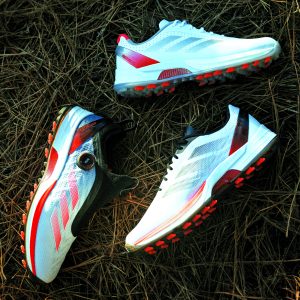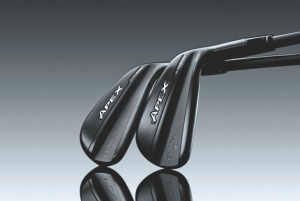The New M1
TaylorMade is elevating performance once again by focusing on materials and geometry designed to deliver improved launch conditions, increased personalization and more forgiveness for every golfer, answering the challenge to once again design the best-performing clubs in company history.
M1 Driver

By way of a new, lower density Titanium alloy called 9-1-1 and an added carbon toe panel that accounts for a total of 43% more Carbon composite than its predecessor, the new M1 460’s mass properties have been optimized to deliver optimal launch conditions, more personalization and increased forgiveness. The iconic two-tone crown of the M1 driver incorporates a proprietary 6-layer Carbon composite panel that is precision-fit to the skeletal titanium body. The new Carbon composite crown in the new M1 saves more weight because the composite is 10% thinner, the bonding ledge is 18% shorter and the adhesive is half the thickness than the original M1. Furthermore, the new M1 also has a composite sole panel which utilizes the same thinner composite, shorter ledge and thinner adhesive approach as the crown. The combined weight savings of the new M1 composite crown and sole panel construction is 8g lighter than an equivalent titanium construction. The new M1’s CG is lower than that of its predecessor which results in a CG projection that is even closer to the centre of the face for a hotter trajectory and more ballspeed protection at all impact locations. TaylorMade engineers relied on proven internal acoustic management techniques and modified them as necessary to meet the demands of new materials and shaping. The result: the re-definition of best-in-class sound to control vibration and pitch at impact. Combined,
TaylorMade has delivered maximum distance and forgiveness through multimaterial use and complete personalization. New to the next-generation of M drivers is a 440cc model, which utilizes a slightly smaller head, deeper face and 30g of moveable weight, working in unison with all of the same technologies as its larger 460cc counterpart. Both the 460 and 440cc models feature a new 4-degree ultra-lightweight aluminium loft sleeve (backsleeve compatible). Having partnered with many of the industry’s leading shaft manufacturers, TaylorMade also allows golfers a plethora of shaft options to personalize their M1.
M1 Fairway

Constructed with a 450 stainless steel body, strong Ni-Co C300 face and same 6-layer Carbon composite crown as the M1 driver, the completely re-designed and reshaped M1 fairway has a track system that has been shifted more rearward to make room for a new open channel Speed Pocket designed to deliver more ball speed & more forgiveness. Similar to the M1 driver, a carbon fibre crown is bonded onto the head of the new M1 fairway by way of the same precision manufacturing process and replaces the majority of the steel that was formerly on the crown and also lowers the centre of gravity. The track was moved back behind the Loft Sleeve pocket in order to make room for a through-slot which promotes faster face-flex and ball speed on mis-hits low on the face and also reduces backspin leading to more overall distance. The sides of the weight were angled to match the shape of the head which allowed engineers to maximize the length of the track, permitting CG to remain as low as the original M1 while maintaining the same heel-to-toe CG movement. The result is TaylorMade’s longest adjustable fairway. The new design of the open-channel Speed Pocket is designed to deliver more distance through increased speed & lower spin, as well as forgiveness by way of ball speed protection on shots struck low on the face. A new advanced design with a recessed rear sole – divided by the sliding weight track delivers improved sole to ground performance. Golfers can personalize this new, longer M1 fairway more than ever with the new ultralightweight aluminium 4-degree loft sleeve, 25g draw-neutral-fade sliding weight and over 30 aftermarket shafts.
M1 Rescue

The new M1 Rescue features a moderate sized, Tour-proven shape and a newly designed sole that will appeal to a larger demographic of player, offering more playability from an increased variety of lies. The sole is engineered with TaylorMade’s first-ever sliding weight system in a hybrid, providing golfers the opportunity to not only experience the neutral/fade biases of its predecessor but with the added option of draw setting – as well as anything in between for ultimate shot shape adjustability and personalization. In addition to the new 27g sliding weight track and advanced sole design, the head comes equipped with a new, 3-degree ultra-lightweight aluminium loft sleeve.
M1 Irons

The intention while designing the M1 irons was to bring speed, forgiveness and playability without sacrificing low-CG, COR or MOI. To do this, the company first focused on removing weight high in the clubhead, utilizing 15-gram highdensity Tungsten added in the toe-side sole of the 3 through 7 irons to lower and centre the CG; designed to create even more speed and thus more distance by way of an increased moment of inertia on off-centre impacts. Through the incorporation of Tungsten, TaylorMade was able to locate the centre of gravity less than 1mm from centre face along the heel-toe axis as well as drop the vertical position of the centre of gravity in the 3 through 7 irons. The company has also redesigned its fluted hosel, which is now a 180° design that has successfully accomplished weight savings without compromising the look preferred by better players at address. Returning to the M1 irons are the company’s proprietary Face Slots, which are designed to increase flexibility at the boundary of the clubface to improve consistency of ballspeed on off-centre impacts. The flexibility of the face is also intended to ensure maximum COR under USGA/R&A rules, providing maximum ballspeed and higher launch. This combination of technologies is designed to produce longer, higher shots with improved consistency and dispersion on all shots. The new Speed Pocket in the irons feature a front wall that has been reduced 33% in thickness to promote increased face deflection. Engineers have also been able to thin the leading edge and overall sole thickness of the club to new minimums, resulting in improved performance without sacrificing durability. The result is a visual appearance at address suited for the aspirational and better players while offering performance typically found in modern distance irons and maintaining the turf interaction forgiveness of a wider, more cambered sole. One of the challenges with thin face, high COR irons is the sound they produce at impact. The M1 irons implement TaylorMade’s Geocoustic engineering; acoustics tuned through geometry. TaylorMade’s fin badge is a feature that works in conjunction with Face Slots to dampen unwanted low frequency, long duration sounds. The sound of the M1 is optimized using thin yet stiff head geometry combined with strategically placed reinforcements in the topline. The resulting sound is then dampened using a very stiff fin badge connecting the back of the flexible face to the stiff back bar of the iron for optimal sound damping.
More posts

A TRUE OG IN STREET-STYLE GOLF
03 Apr 2025
WALKING ON AIR
11 Feb 2025

